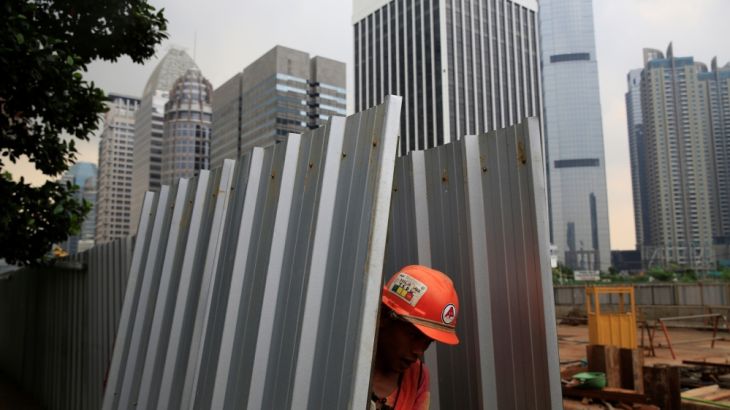
What is holding Indonesia’s economy back?
As Indonesia is on the road to becoming one of the world’s biggest economies, we look at challenges facing the country.
Indonesia’s economy isn’t growing as fast as President Joko Widodo had promised it would when he was elected five years ago. But the president, who is also known as Jokowi, has put the economy at the centre of his pitch to voters for the April elections once again. He is spending huge sums to try to get re-elected for a second term, giving regional governments billions as well as giving hand-outs to the country’s poorest.
While Indonesia is well on its way to becoming a $2 trillion economy in the next five years, a population of more than 250 million people strung across more than 17,000 islands is being held back by – among other things – poor infrastructure.
Keep reading
list of 4 itemsBiden slaps new tariffs on Chinese imports, ratcheting trade war
One of the biggest hurdles for athletes on the Olympic path: Money
Key takeaways from Xi Jinping’s Europe trip
The World Bank estimates that Indonesia has an infrastructure gap of $1.5 trillion compared with other emerging markets. Widodo is halfway through a 10-year, $327bn programme to construct new airports, highways and ports.
Indonesia’s first subway has opened in the country’s capital, Jakarta last week – a development that’s seen as crucial to tackling some of the world’s worst congestion costing Indonesia billions in lost revenue.
So what is holding Indonesia’s economy back? And could it damage the president’s hopes for re-election?
“I think there’s a number of factors … [holding back the economy],” says Gareth Leather, senior economist at Capital Economics. “I think more fundamentally, it’s just been a failure to revitalise the manufacturing sector, which, when he [Joko Widodo] set out five years ago was one of his key aims … In Indonesia, it’s incredibly expensive to hire and fire workers. And what that means is that people are reluctant to set up manufacturing facilities in Indonesia when they could so much more cheaply in neighbouring, say Vietnam for example. I think that’s been the key reason why growth has failed to come anywhere near the government’s target.”
According to Leather, Widodo “has made some reasonable progress in infrastructure spendings … The key thing that he really needs to do is press ahead with these labour market reforms … I think without that then Indonesia is really going to struggle to attract the kind of manufacturing sector that it needs to really raise growth above the five percent that we seem to be stuck at the moment.
“If you look at the most successful Asian economies since the second World War … What they all had in common was a very competitive export-orientated manufacturing sector. Now this is something that Indonesia really struggled to create and generate …. Until you see the big changes in the labour market – and also land reform is another area that he hasn’t really touched on – Indonesia is really going to struggle.”
Also on Counting the Cost:
Struggling to earn a living in Manila: Around one in five of the Philippines’ 106 million people live in extreme poverty, getting by on less than $2 a day. Many, including children, work long hours as street vendors or labourers to make enough money to feed themselves. Hunger occurs most in the agriculture and fishing sectors where 70 percent of workers are poor. Jamela Alindogan reports from Manila.
Political funding in India: India’s Prime Minister Narendra Modi declared the country a space power after the successful test of an anti-satellite missile, but opposition leaders complain that Modi used the test to score political points. More than 900 million Indians will go to the polls in the world’s biggest democratic process beginning on April 11. Political parties are expected to spend $7bn over the election cycle that ends on May 23. But who is financing political parties and their candidates? Sreeram Chaulia, Jindal School of International Affairs, talks to Counting the Cost about political funding, recent reforms and the issues around it.
Community farms in Venezuela: Community farms are springing up in the oil-rich nation of Venezuela as US economic sanctions kick in. Venezuela produces only 20 percent of the food it consumes and a turn to farming is crucial for them to survive in the face of their political and economic crises. Teresa Bo reports from Caracas.
Mexico’s soup kitchens for the poor: Mexico’s leftist president, Andres Manuel Lopez Obrador, swept to power on a promise to help the country’s poorest, but now he is axing social programmes – in what he claims to be an attempt to stamp out corruption. John Holman reports from Mexico City.